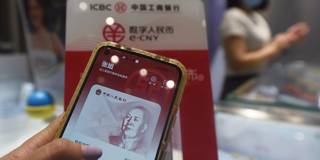For two decades, Sino-Western integration powered the global economy and seemed to foster greater geopolitical stability. But now that China has moved well beyond being a mere exporter of low-cost labor-intensive garments and electronics, both the economics and the politics of its rise have fundamentally changed.
- Martin Chorzempa, The Cashless Revolution: China’s Reinvention of Money and the End of America’s Domination of Finance and Technology, PublicAffairs, 2022.
Edwin L.-C. Lai, One Currency, Two Markets: China’s Attempt to Internationalize the Renminbi, Cambridge University Press, 2021.
Andrew Small, The Rupture: China and the Global Race for the Future, Hurst Publishers, 2022.
Paul Tucker, Global Discord: Values and Power in a Fractured World Order, Princeton University Press, 2022.
LONDON – China’s rise has been the defining story of the past three decades. No analysis of international economics or politics can ignore it. But the conversation has shifted over time. Before 2017, it was widely believed that China could become a “responsible stakeholder” in the international institutions that emerged after World War II and survived the Cold War. But now, many worry that China is “an illiberal state seeking leadership in a liberal world order,” as former Bank of England Deputy Governor Paul Tucker puts it in Global Discord. The question, then, is how liberal democracies with market economies should deal with such a state when it becomes a systematically important power.
None of the four books reviewed here provides a convincing answer – but that may be because the China question does not admit of one. Instead, each author offers a clear narrative of China’s transformation from a poor developing country to the main global competitor to the West. Perhaps most important, China has gained a lead in cutting-edge technologies such as telecommunications, fintech, and artificial intelligence – all sectors of great strategic importance not only for future economic competitiveness but also for international and national security.
Understanding China’s advantage in these areas is critical to recognizing why it is no longer on the path to becoming a “responsible stakeholder” in the world economy. China’s leaders simply do not have as strong an incentive as they once did to live with – and within – a US-led system.

Edwin L.-C. Lai, One Currency, Two Markets: China’s Attempt to Internationalize the Renminbi, Cambridge University Press, 2021.
Andrew Small, The Rupture: China and the Global Race for the Future, Hurst Publishers, 2022.
Paul Tucker, Global Discord: Values and Power in a Fractured World Order, Princeton University Press, 2022.
LONDON – China’s rise has been the defining story of the past three decades. No analysis of international economics or politics can ignore it. But the conversation has shifted over time. Before 2017, it was widely believed that China could become a “responsible stakeholder” in the international institutions that emerged after World War II and survived the Cold War. But now, many worry that China is “an illiberal state seeking leadership in a liberal world order,” as former Bank of England Deputy Governor Paul Tucker puts it in Global Discord. The question, then, is how liberal democracies with market economies should deal with such a state when it becomes a systematically important power.
None of the four books reviewed here provides a convincing answer – but that may be because the China question does not admit of one. Instead, each author offers a clear narrative of China’s transformation from a poor developing country to the main global competitor to the West. Perhaps most important, China has gained a lead in cutting-edge technologies such as telecommunications, fintech, and artificial intelligence – all sectors of great strategic importance not only for future economic competitiveness but also for international and national security.
Understanding China’s advantage in these areas is critical to recognizing why it is no longer on the path to becoming a “responsible stakeholder” in the world economy. China’s leaders simply do not have as strong an incentive as they once did to live with – and within – a US-led system.